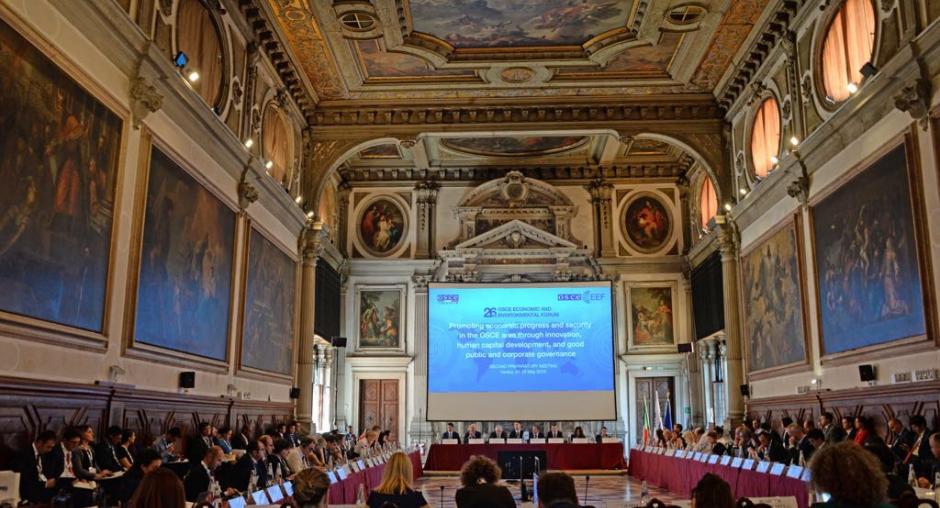Dialogue on future of human capital development, economic progress and security in OSCE area must involve all stakeholders, say participants at discussion in Venice

VENICE, Italy, 24 May 2018 – Economic progress and security in the OSCE area through innovation, human capital development and good public and corporate governance were the focus of the two-day Second Preparatory Meeting of the Economic and Environmental Forum which opened today in Venice.
Organized by the Italian 2018 OSCE Chairmanship and the Office of the Co-ordinator of OSCE Economic and Environmental Activities, the event brought together some 150 high-level officials from the OSCE’s 57 participating States and 11 Partners for Co-operation as well as representatives of the business community, civil society and academia to discuss how the Fourth Industrial Revolution has already and will continue to transform the dynamics of demand and supply in the labour force.
Permanent Representative of Italy to the OSCE Alessandro Azzoni welcomed the participants, underlining how the promotion of joint strategies at the international level “could certainly assist our governments and citizens to manage the digital transition with the least possible disruption”.
In this regard Italy’s 2018 OSCE Chairmanship Co-ordinator Vinicio Mati stressed how the OSCE was good platform of dialogue where participating States can have a fruitful exchange of best national practices. “The major challenge for our governments is that of transforming digital societies into fair and inclusive societies, capable of helping citizens to reinvent themselves in a constantly changing reality,” he said.
One of the main topics of discussion over the next two days will be how to maximize potential benefits and make innovation a concrete source of prosperity, competitiveness and well-being for all. Participants will look at some of the key challenges presented by digital innovation in the labour market and the role the OSCE can play in addressing them, including their security implications and human capital development.
Paola Severino, the first Special Representative of the OSCE Chairperson-in-Office on Combating Corruption, stressed that public authorities have to assume the fundamental and complex responsibility of ensuring sustainable economic development: “The most successful action that good public governance can take actually consists in enhancing good governance and thus preventing corruption, boosting mechanisms that reward compliance by economic actors.”
The European Bank for Reconstruction and Development (EBRD) and the OSCE agreed last year to deepen their co-operation and establish a strategic partnership to promote good governance, connectivity and economic development.
Enzo Quattrociocche, the EBRD Secretary General, said: “Promoting good governance at both national and corporate levels is one of the EBRD’s core activities in countries where it invests. We are pleased to join forces with the OSCE and step up efforts to support good governance and promote an enabling business environment.”
The topics of the debate will also intersect with relevant UN Sustainable Development Goals, including Goal 4 “Quality of education for all”, Goal 8 “Decent work for all” and Goal 17 “Partnerships and co-operation”.
Vuk Žugić, Co-Ordinator of OSCE Economic and Environmental Activities, said that it is essential that the dialogue on the future of work is inclusive, involving major stakeholders, governments, think tanks, enterprises, workers’ associations and experts. “Only together can we move beyond good intentions,” he said.
The Concluding Meeting of this year’s Economic and Environmental Forum is due to take place in Prague from 5 to 7 September 2018.
